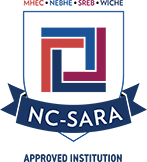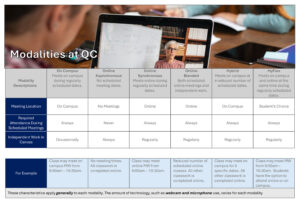Online Learning
Quincy College Online
Whether you are taking one course or interested in pursuing your degree fully online, Quincy College has the support, resources and faculty trained to teach online and help you achieve your academic goals. All faculty teaching online have been trained to use Canvas, our learning platform, and build out our online courses using the Quality Matters Higher Education Rubric. Quincy College is a subscriber to Quality Matters, the international leader in high-quality course design.
Whether you take classes online or on-campus, your success matters to us. As a member of our QC community you will receive support and guidance from the time you apply to your graduation by one of our academic advisors and our student success coaches.
QC offers fully online degree and certificate programs. These academic programs are offered in flexible full or part-time pathways to help you reach your academic and professional goals.
Quality Matters at Quincy College
 Quality Matters is a highly regarded program that encourages and recognizes quality online course design. Courses are internally and externally peer-reviewed based on the QM rubric. Quincy College is proud to be a member of the nationally acclaimed Quality Matters program. Our QM affiliation supports improving online course design through the use of ongoing QM professional development, and internal and external peer-reviews. For more information about Quality Matters, please visit: https://www.qualitymatters.org/
Quality Matters is a highly regarded program that encourages and recognizes quality online course design. Courses are internally and externally peer-reviewed based on the QM rubric. Quincy College is proud to be a member of the nationally acclaimed Quality Matters program. Our QM affiliation supports improving online course design through the use of ongoing QM professional development, and internal and external peer-reviews. For more information about Quality Matters, please visit: https://www.qualitymatters.org/
Quincy College is SARA Approved
 Quincy College has been approved to participate in the National Council for State Authorization Reciprocity Agreements. Students from 49 states (all but California), the District of Columbia, Puerto Rico and the U.S. Virgin Islands can be accepted into our online classes and programs.
Quincy College has been approved to participate in the National Council for State Authorization Reciprocity Agreements. Students from 49 states (all but California), the District of Columbia, Puerto Rico and the U.S. Virgin Islands can be accepted into our online classes and programs.
Quincy College has been approved by The Commonwealth of Massachusetts to participate in the National Council for State Authorization Reciprocity Agreements. NC-SARA is a voluntary, regional approach to state oversight of postsecondary distance education.
What does it do?
The State Authorization Reciprocity Agreement (SARA) is an agreement among member states, districts, and territories in the United States, which establishes comparable national standards for interstate offering of post-secondary distance education courses and programs. SARA is overseen by a national council (NC-SARA) and administered by four regional education compacts. What does it do? It simplifies the process of taking online courses for credit at an institution of higher education based in another state. Quincy College operates it’s distance education classes and programs under the provisions for out of state students set by SARA. Click here to view a list of participating state and territories>>
Online Courses & Programs
At Quincy College we recognize that taking courses on campus does not work for everyone. Taking online courses with us means that you can work toward a degree from the flexibility and convenience of anywhere at a time that works for you. All of our online courses are developed using the Quality Matters Higher Education Rubric to ensure the highest-quality course design in preparation for real-world success.
Taking online classes at QC also means that you receive support from our entire College community. From the personalized support of our advisors and tutoring services to the dedication from our faculty, librarians, the Learning Innovation Hub and IT support, we are here to help you throughout your educational journey to success.
Quincy College currently offers 7-week, 10-week and 15-week online courses. We offer a diversity of courses within Liberal Arts, Professional Programs, and Natural & Health Science disciplines. Search current online course schedule>>
Continuing Education/Non-Credit Courses
The Workforce Development Department at Quincy College, offers a wide array of classes and customized programs (on campus and online) to individuals in career transitions, those reentering the workforce, updating technical skills, or seeking knowledge enrichment. In conjunction with our educational partner MindEdge, we offer a wide array of online noncredit professional development and career advancement training courses many of which offer Continuing Ed. Units. Courses are affordable and flexible. Learn more>>
SmarterMeasure
Students accepted into the fully online programs, part-time or full-time are required to take the SmarterMeasure – Learning Readiness Indicator (LRI). The LRI measures a student’s level of readiness to engage in an online academic program in a technology rich learning environment. The LRI is used for aligning fully online students with campus support services, advising, and is used in IDS 167 – First Year Seminar.
Online Course Modality Overview

At a Glance Course Modality Definitions
- On campus: Classes meet in a classroom on a set schedule.
- Online Synchronous: Fully online classes on a set schedule that meet over a video conferencing platform.
- Online Asynchronous: Fully online classes without a set schedule. Course materials are managed online within Canvas.
- Hybrid: Classes meet in a classroom at a reduced schedule. Course materials are managed online within Canvas.
- Online Blended: These classes use a combination of unscheduled online work, as well as a set schedule of class meetings over a video conferencing platform.
- HyFlex: Classes meet on campus and online at the same time on a set schedule. Students choose to attend online or on campus.
- Note: International and Military students must attend on campus.
HyFlex
On Campus Classes Work Best for Students Who
- Have time to attend scheduled class sessions on campus.
- Are more motivated to focus on schoolwork away from the distractions of home.
- Prefer to being on campus to study and complete assignments before or after class rather than at home.
- Prefer regular face-to-face interaction with the instructor and peers.
Online Synchronous Classes Work Best for Students Who
- Can attend scheduled, online class sessions using a video conferencing platform like Zoom.
- Have a quiet, physical place to be without distractions during the scheduled, online classes.
- Feel comfortable using technology such as Zoom, Microsoft Teams and Canvas.
- Have technology such as a laptop, webcam, and microphone to interact with the course material in Canvas and attend online class sessions using Zoom or Microsoft Teams.
Online Asynchronous Classes Work Best for Students Who
- Are independent learners.
- Have effective time management skills to manage online course expectations such as viewing instructional content and submitting assignments and assessments online.
- Feel comfortable using technology such as Zoom, Microsoft Teams and Canvas.
- Have technology such as a laptop, webcam, and microphone to interact with the course material in Canvas.
Online Blended Classes Work Best for Students Who
- Can attend scheduled, online class sessions using a video conferencing platform like Zoom.
- Have a quiet, physical place to be without distractions during the online classes.
- Have effective time management skills to manage online course expectations such as viewing instructional content and submitting assignments and assessments online.
- Feel comfortable using technology such as Zoom, Microsoft Teams and Canvas.
- Have technology, such as a laptop, webcam, and microphone to interact with the course material in Canvas and attend online class sessions using Zoom or Microsoft Teams.
Hybrid Classes Work Best for Students Who
- Are independent learners.
- Have effective time management skills to manage online course expectations such as viewing instructional content and submitting assignments and assessments online.
- Have time to attend scheduled class sessions on campus.
- Feel comfortable using technology such as Zoom, Microsoft Teams and Canvas.
- Have technology such as a laptop, webcam, and microphone to interact with the course material in Canvas.
HyFlex Classes Work Best for Students Who
- Have time to attend scheduled classes on campus or online using a video conferencing platform like Zoom.
- Have a quiet, physical place to be without distractions if choosing to meet online for class.
- Feel comfortable using technology such as Zoom, Microsoft Teams and Canvas.
- Have technology such as a laptop, webcam, and microphone to interact with the course material in Canvas.
Professional Licensure and Certification Requirements
For students that reside outside of the Commonwealth of Massachusetts
- Professional licensure and certification requirements vary from state to state. Licensure and certification in one state do not guarantee automatic licensure in another state. Quincy College offers courses and programs that may lead to professional licensure or certification in states outside of Massachusetts. Quincy College has not made a determination that its curriculum meets State educational requirements for licensure or certification in states outside of Massachusetts.
- Students in programs that lead (or may lead) to out-of-state licensure or certification should speak to their Quincy College Academic Advisors and/or Deans about licensure requirements.
- At this time, Quincy College cannot confirm if programs meet the prerequisites for professional licensure or certification outside of Massachusetts.
- Out-of-state students should consult relevant associations, boards, agencies or governmental bodies within their states for licensure and/or certification information.
View the chart of online programs that may or may not require additional licensure outside of the Commonwealth of Massachusetts. For best in-document linking experience, please download “chart” to your desktop.
Online Student Complaint Policy and Procedure
At Quincy College, we attempt to resolve student complaints within our academic and administrative departments, as specified in Policy 6.14 Student Grievance Procedure (Policy Manual page 177) contained in the Quincy College Policy Manual. Note: Students with concerns about grades should first refer to Policy 5.14: Final Grade Appeal Process (Policy Manual page 147). For all Sexual Misconduct related matters, please refer to the Policy 3.03: Quincy College Sexual Misconduct Policy and Procedures in Accordance with the Violence Against Women Act (Policy Manual page 62).
Students who have a grievance or complaints are encouraged to first address his/her grievance with the individual against whom the grievance exists. Online and distance education students who have a grievance or complaints may submit complaints to the College by completing this Complaint Form [PDF], and emailing it to onlineprograms@quincycollege.edu. After the student submits the Form, it will be forwarded to the appropriate academic or administrative department. The appropriate department will send an email response to the student informing that the grievance or complaint was received and is under review.
A student is encouraged to utilize the College’s internal complaint process. If a student’s complaint is not satisfied at the institutional level, the student may file a complaint with the Massachusetts Department of Higher Education (DHE):
For Massachusetts Residents and Online Students in Non-SARA Member States and Territories
If a student’s complaint is not resolved at the institutional level, the student may file a complaint with DHE by using the general complaint form. The DHE general complaint form should be used by students who are located in:
- Massachusetts
- Non-SARA Member States or Territories (e.g., California, Guam, etc.)
For Online Students Located in SARA Member States and Territories
After the student has exhausted the complaint procedures made available by Quincy College, if the student’s complaint has not been resolved, the student may file a complaint with the DHE by using the SARA complaint form. The DHE SARA complaint form should be used by students who are located in SARA member states and territories. This includes all students who are located in SARA member states and territories for the purposes of completing out-of-state learning placements, such as internships, practica, clinical experiences, etc., in SARA member states and territories outside Massachusetts.
Additional information from the DHE’s SARA complaint website is below:
The SARA complaint process is as follows:
- Students must first attempt to resolve their complaint using internal administrative procedures offered by the SARA institution.
- After all administrative remedies have been exhausted with the MA-SARA institution, the student may submit a SARA Complaint via the URL below.
- The Department shall send a copy of the complaint to the institution that is the subject of the complaint;
- Within 30 days of the date that the Department sends a copy of the complaint to the institution, the institution must provide a written response to the student and the Department.
Please note that complaints about student grades and student conduct violations are expressly excluded from the SARA complaint process. For information about the DHE’s SARA complaint process, please visit the DHE SARA website and its Complaint Policy and Process.

View Current Semester Courses>>
Start your education at Quincy College this fall. Our online and blended curriculum makes it easy for you to stay safe and earn your degree!
You might also be interested in...
-

IT Services
The Technology department is responsible for the network administration, including data lines, Jenzabar EX, Internet access and phone systems.
-

Student Services
Quincy College Student Services: we are committed to promoting student success by offering services, programs and activities.
-

Areas of Study
Quincy College is a unique learning environment where cultures meet, join forces, and weave a global context around college academics.
-

Courses
View the current course schedule. Quincy College offers the programs you want, the flexibility you need and the price that makes it all possible.



